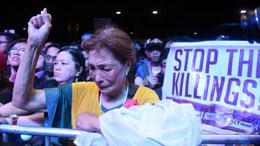Philippines worst in the impunity index

In the Philippines, there is an old adage that it is not what you do but who you know if you want to get away with a crime.
That pervasive philosophy has now been reinforced by a new study that shows the Philippines has the highest level of impunity among 69 countries according to the 2017 Global Impunity Index (GII) released by Universidad de las Americas or UNDAP in Mexico.
The Duterte administration has downplayed the index, saying it must be put in the proper context and that the problems mentioned in the study have been around for a long time.
What is needed is to strengthen the pillars of the criminal justice system to curb impunity, according to presidential spokesman Ernesto Abella.
The country scored 75.6 points in terms of the level of impunity in the country, putting it under nations with “very high impunity index.”
“The Philippines is going through one of its most critical moments, due to the increase of violence related with organized crime and increased terrorist activities from local gangs linked to the Islamic State,” the report said.
The Philippines scored 94.06 for its structural security system and 99.07 for its structural justice system, indicating that the country has not yet installed the capacities needed to deliver justice and security.
It is relatively middling in terms of functional security and justice, with scores of 44.64 and 42.64.
In terms of the human rights dimension, the country received a 97.99 rating, which points to a lack in the government’s drive to analyze and understand the human rights situation in the country.
The index is different from another one with the same name that focuses on impunity in the killing of journalists. The Philippines also ranks among the five worst countries in this index drawn up by the Committee to Protect Journalists.
Excluded from the UNDAP study were 124 other member states of the United Nations, because of the lack of relevant information on the dimensions measured.
The UNDAP report came as the Duterte administration continued to receive criticism over the killings related to its war on drugs. The anti-illegal drug campaign has resulted in the killing of more than 12,000 individuals, a figure that the government has been disputing.
The United Nations Commission on Human Rights (UNCHR) defines impunity as “the impossibility, de jure or de facto, of bringing the perpetrators of violence to either criminal, civil, administrative or disciplinary proceedings.”
This is because the perpetrators are not subject to any inquiry that may lead to their arrest, trial and, if found guilty, sentencing with appropriate penalties, including reparations to the victims, the UNCHR said.
Following the Philippines on this list were India (70.94), Cameroon (69.39), Mexico (69.21), Peru (69.04), Venezuela (67.24), Brazil (66.72), Colombia (66.67), Nicaragua (66.34), Russia (64.49), Paraguay (65.38), Honduras (65.04) and El Salvador (65.03).
In Asia Pacific, Japan and Singapore have the lowest level of impunity.
The country with the lowest impunity index in the world is Croatia which got a score of 36.01 points, followed by Bulgaria (37.19), Slovenia (37.23), Sweden (39.15), Norway (40.9), Montenegro (42.13), Czech Republic (42.83), Greece (44.56), Germany (45.10) and the Netherlands (45.31).
The US was classified as a country with an intermediately high impunity level with a score of 64.68.
The GII monitored criminal justice procedures beginning with the commission of crime or offense, continuing with crime reporting and investigation and concluding with a judgment or means to redress the injustice done.
It measured impunity using two factors. First was the functionality of security, justice systems and the protection of human rights, which was scored according to indicators such as the percentage of individuals detained without judgment and the ratio of prosecutors to individuals brought before courts.
The second factor was the structural capacity of the justice systems with indicators such as the number of cops or judges per 100,000 of the population and the number of prisoners compared to the overall jail capacity.
Manila downplayed the country’s worst impunity index and defended anew the Duterte government’s bloody war against drugs.
Abella also said that “resistance” from those adversely affected by the government’s campaign against illegal drugs has been “strong” and “internal cleansing by organized crime have all had violent results.”
But opposition lawmakers blamed President Duterte for the country’s highest ranking in the 2017 global impunity index.
“Thousands of suspects killed in the war on drugs by state agents without going through due process of law and unsolved killings perpetrated by vigilantes are indication enough that impunity exists in the country,” Rep. Gary Alejano of Magdalo said.
“I believe that Duterte, by his numerous public pronouncements of condoning, encouraging and rewarding state agents to kill drug suspects, has adopted a policy of killings… With the President promising to pursue the war on drugs with more vigor, let us expect more killings of drug suspects,” he added, according to local media reports.






